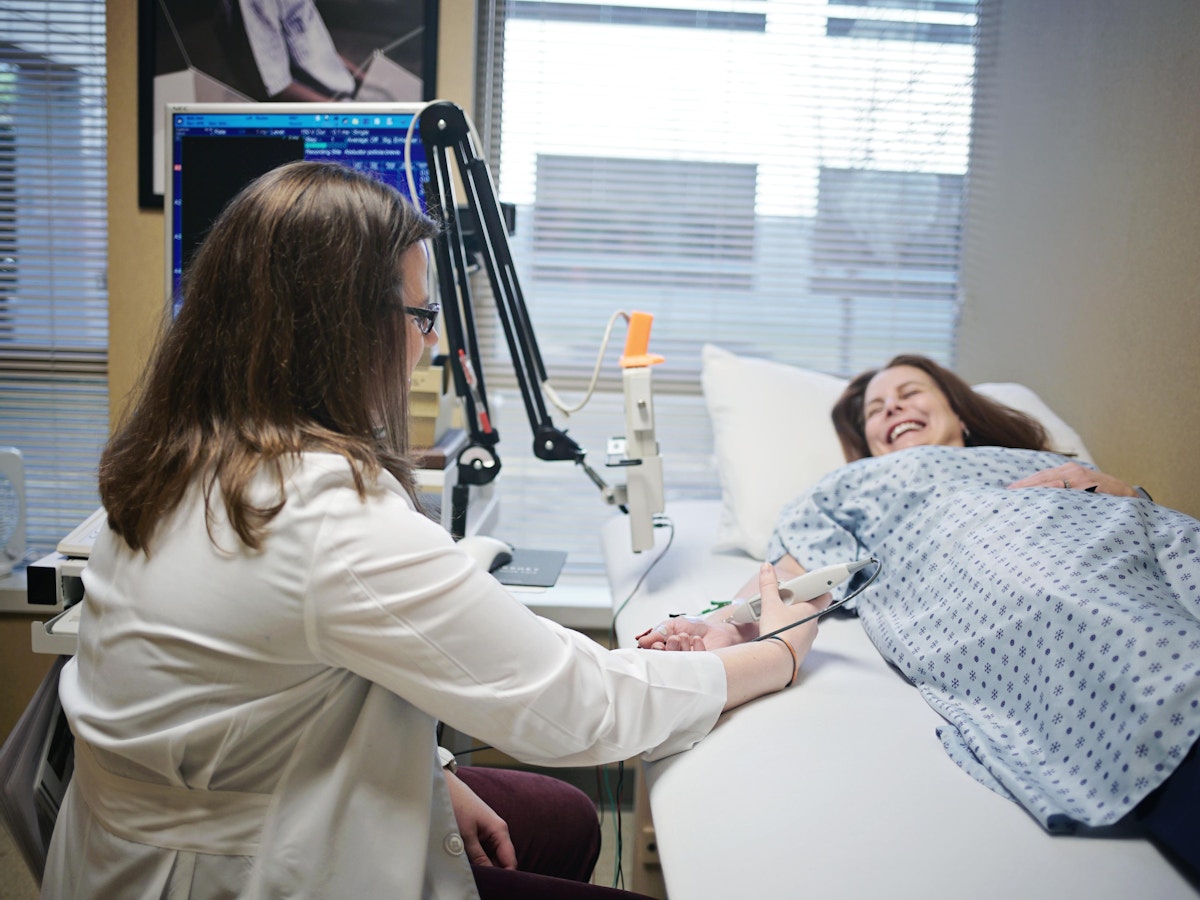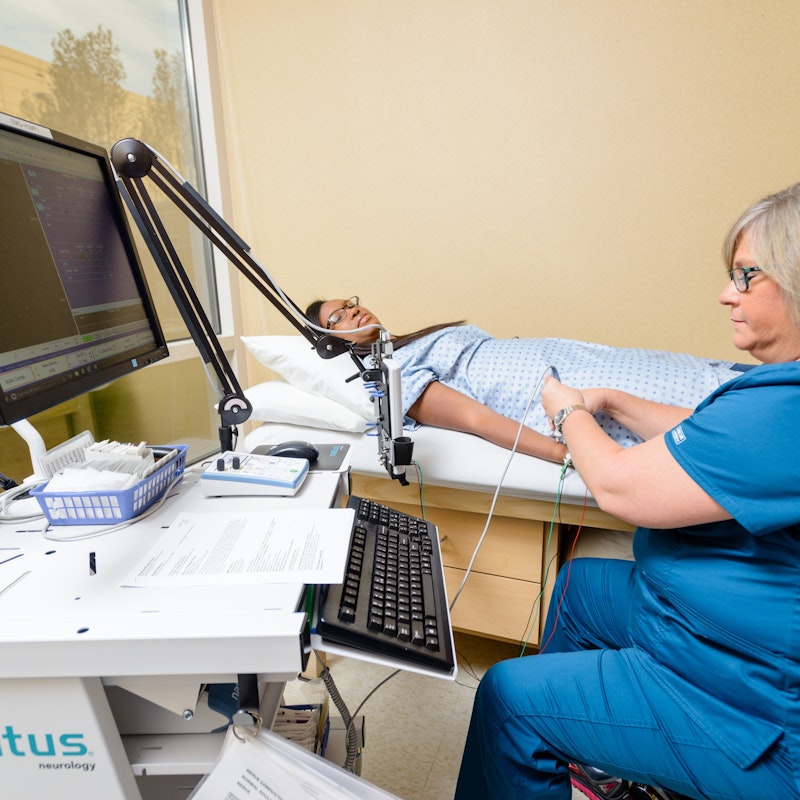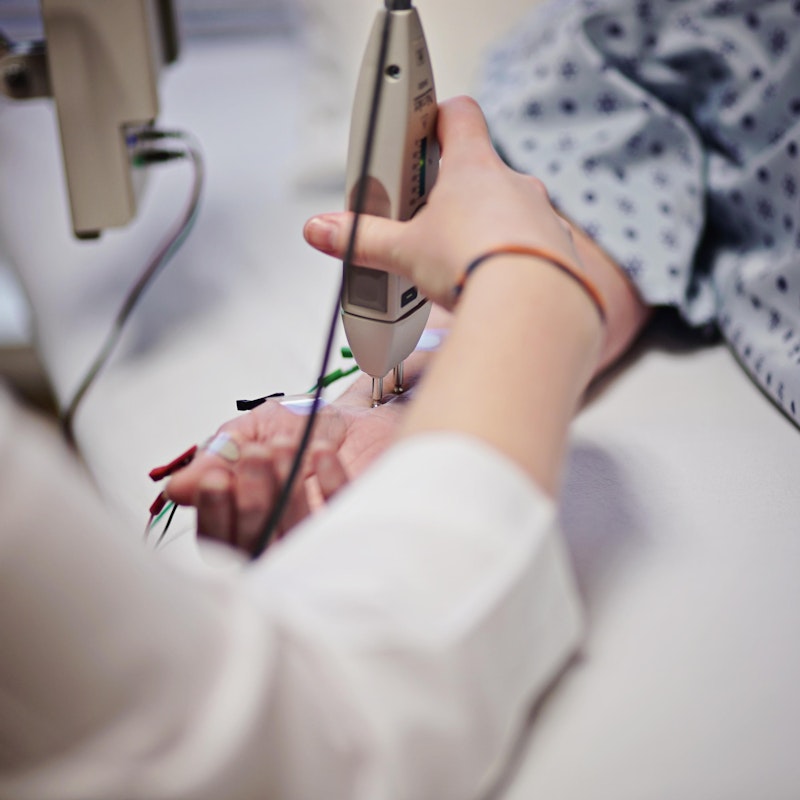Electromyography (EMG) and Nerve Conduction Study (NCS)

Electromyography (EMG) and Nerve Conduction Studies (NCS) are tests used to detect problems related to nerves, muscles, or the spinal cord, which include symptoms such as muscle weakness, numbness, spasms, paralysis, and pain.
Specifically, an EMG tests the health of muscles and the nerve cells that control them, and an NCS determines nerve damage that causes muscles to react in abnormal ways.
These exams are the major diagnostic tools of Clinical Neurophysiology—a medical specialty that studies the central and peripheral nervous systems through the recording of bioelectrical activity.
EMG and NCS are often performed in the same appointment which can last up to an hour.
Why do I need this test?
These tests are helpful if you have symptoms of a nerve or muscle problem such as tingling, numbness, muscle weakness, or muscle pain.
Specifically, they monitor and detect changes in electrical activity in nerves and muscles and help diagnose:
- Pinched nerves and inflamed muscles due to injury, ruptured disk, disease, or other conditions
- Carpal tunnel syndrome pressure on a nerve causing pain in wrist or hand,
- Primary muscle disorders such as muscular dystrophy
- Neuromuscular disorders such as myasthenia gravis, which causes chronic muscle weakness
- Motor neuron disorders such as Lou Gehrig’s disease
Are there any risks?
NCS and EMG are both low-risk procedures. Complications are rare.
However, people with certain medical conditions may face increased risks. Be sure to talk to your healthcare team about all risks and benefits.
These tests are very beneficial and can help your healthcare provider make an accurate diagnosis and effective treatment plan for you.
What should I do to prepare?
To prepare for these tests, simply make sure that your skin is free from oils and lotions. Take a shower or bath shortly before the test to remove oils from your skin.
Avoid alcohol on the day of your test and avoid tobacco a few hours before your test.
Wear comfortable, loose-fitting clothing, and eat as you normally would.
You must let the specialist know if you:
- Have a pacemaker or any other electrical medical device
- Take blood-thinning medications
- Have hemophilia or lymphedema/lymphoma
Tell your healthcare provider about all medications you are taking and all medical conditions. Based on your medical condition, your doctor may request other specific preparation.
What should I expect during the test?
EMG or NCS tests can cause a slight level of temporary discomfort. But anesthesia or sedatives are not necessary.
First, you will change into a hospital gown and lie down on your back.
NCS – A specialist will attach recording electrodes to your skin and place stimulating electrodes against your skin depending on where you're having symptoms.
The electrodes send a tiny electrical current through your nerves, and you will feel a small shock. The specialist will use a two-pronged stimulator to test and record your nerve activity.
With the specialist’s direction, you will rest and contract the muscles of each test site. Each site is tested two to three times.
EMG – During this test, one or more very thin needle electrodes will be inserted gently inserted into the muscle.
You may experience slight pressure or dull ache with the insertion of the electrode. The needle acts an amplifier to test and record activity at the muscle sites.
Other electrodes will be attached to your skin. The muscles will be tested at rest and while contracted.
You will be able to continue normal daily activity immediately afterwards but may feel tenderness or soreness for a few hours in the tested areas.
When will I receive my results?
A doctor trained to analyze EMG and NCS test results will interpret your results which will be sent to your doctor. He or she will discuss the results at your next appointment.
This information was provided by the specialists at Semmes Murphey Clinic. Readers are encouraged to research trustworthy organizations for information. Please talk with your physician for websites and sources that will enhance your knowledge and understanding of this issue and its treatments.



Experience the Semmes Murphey Difference for yourself.
Request An Appointment